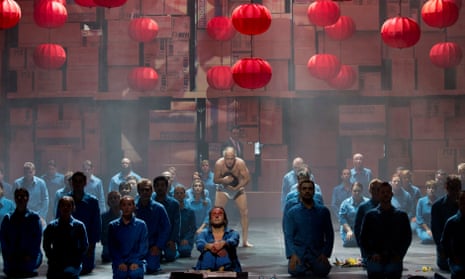When Turandot had its first performance in 1926, two years after Puccini’s death, conductor Arturo Toscanini famously ended the show with the last section the composer had completed – ex-king Timur’s mourning for the dead slave-girl, Liù. Almost every performance since has used a completion by Puccini’s younger contemporary Franco Alfano, who created from Puccini’s sketches the duet between Turandot and Calaf and the opera’s brief celebratory final scene.
Calixto Bieito’s production ends as Toscanini did, leaving the drama deliberately incomplete; the Spanish director apparently believes that Puccini wanted a quiet ending – though on what authority, he doesn’t say. Another peculiarity is to play the three acts without interval, giving audiences two hours of music to sit through at one go. Puccini intended no such thing.
Northern Ireland Opera has been raising its game, and this new version of Puccini’s Chinese epic under an internationally famous director represents a further broadening of its ambitions. However, Bieito has always been an uneven quantity, and his staging – which relocates the opera from legendary China to a communist-era factory where uniformed workers make plastic baby dolls – represents an accumulation of his weaknesses, rather than his strengths.
Turandot already contains explicit violence: the anti-heroine is a ruler who executes her suitors on a point of principle, while Liù commits suicide after being tortured on stage. But in Bieito’s production the level of brutality is constantly raised and wildly overemphasised; with its endless whippings, beatings and a simulated rape, it feels like a self-parody.
Watching Stephen Richardson’s sonorous Timur being strangled at the end of his elegy for Liù, while Miriam Murphy’s vocally fearless Turandot is pulling apart a series of plastic babies nearby, it’s hard not to feel that Bieito has become a victim of his own excess.
It’s a pity, because musically this is a worthwhile performance. The cut and thrust of Murphy’s dramatic soprano is just what the title role needs, while tenor Neal Cooper’s tireless Calaf answers her note for note and Anna Patalong makes a touchingly sensitive Liù.
The trio of Chinese ministers Ping, Pang and Pong – comic-grotesque commedia dell’arte figures in the original, here gruesomely sadistic army officers – are expertly sung by Paul Carey Jones, Andrew Rees and Eamonn Mulhall respectively. Christopher Gillett manages to offer Emperor Altoum a measure of vocal dignity, despite wearing only a nappy.
The chorus and children’s chorus sing with power and discipline, while the Ulster Orchestra sounds solid enough under the baton of David Brophy, though in places his conducting could do with more impetus.
- At Grand Opera House, Belfast, until 1 November. Box office: 028-9024 1919.

Comments (…)
Sign in or create your Guardian account to join the discussion